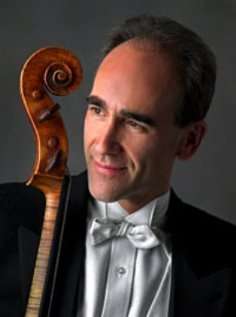|
Back
Hail and Farewell New York
Avery Fisher Hall, Lincoln Center
06/24/2014 - & June 25*, 26, 27, 28, 2024
Ludwig van Beethoven: Concerto for Piano, Violin and Cello in C Major, Opus 56 – Piano Concerto No. 5 in E Flat (“Emperor”), Opus 73
Yefim Bronfman (Piano), Glenn Dicterow (Violin), Carter Brey (Cello)
New York Philharmonic, Alan Gilbert (Music Director/Conductor)

C. Brey (© Chris Lee/New York Philharmonic)
The first Biennial of the New York Philharmonic was a festival of the unknown, the exotic, and the improbable. Like a deep breath after these showcases, the three-week Beethoven Piano Concerto Festival has been less surprising, of course. But with Yefim Bronfman on the keys, one could confidently be assured of –at least–a stolid confident performance, and frequently some spectacular playing.
Mr. Bronfman is the artist-in-residence of the Phil, but the Eminent Artist these weeks has been Glenn Dicterow, the NY Phil Concertmaster for a record-breaking 34 years, a soloist in his own right, and rightly honored. A book has been written in his honor, three discs of this music have been issued, and his appearances around the city have been ubiquitous.
Last night, for instance, he and First Chair Cello Carter Brey joined Mr. Bronfman for the last of the concerto nights. The evening should have been a grand climax, but alas, not even the best of trios can make Beethoven’s ”Triple” Concerto stand out.
Let me change that. By itself, that work can come across as a pleasant showpiece for three professional artists and a sympathetic conductor. But pleasantness stands in the shadows when followed by Beethoven’s ”Emperor” Concerto. Last night, (and for two more evenings), the concert will begin with an amiable slackness and end with an enviable bravura.
Yes, the “Triple” did have its splendid moments. Carter Brey has been soloist with virtually every orchestra in the world, and is an obvious star. If anybody could bring this work out of the notated doldrums, Mr. Brey had top honors. The opening melody of the second movement was played with soulful integrity by Mr. Brey, and one could have wished that he had more solos here.
Instead, it was ensemble work. Messrs Brey and Dicterow played their duets with pleasure, Alan Gilbert as always was the fine accompanist, and only Mr. Bronfman seemed like a champion stallion, nervous at the starting gate, taking his solos with an intensity and speed which belied the other good-natured playing by the others.
Listening to it, one could sit back and enjoy. After the intermission, the “Emperor” was a chance to relish the finger work of a great pianist on his own.
The phrase “Emperor Concerto” offers an emotional cachet without even hearing it. Like the words “Peking Duck” and “Koh-I-Noor Diamond”, one has the feeling that this is an extraordinary experience by itself. And yes, some of us prefer Beethoven’s Fourth Concerto or even (as it was played last week) the Third. But for a pianist of Mr. Bronfman’s stature, the “Emperor” does stand supreme.
One had two choices last night. The dynamic musician breezed through the most difficult runs with an easiness, an almost worldly confidence. At times, one felt that the notes were playing themselves, that the contours were nonexistent. It was massive playing, but not the stuff to get the adrenalin flowing.
The artist in Mr. Bronfman gave it a sensitive, almost delicate reading after that masterly introduction. Rather than standing out, he allowed the orchestra to accompany him. He wasn’t always the soloist. He could shed a sparkling light around the woodwinds in the first movement, or allow Mr. Gilbert’s orchestra to be the “dancing partner” in the finale.
In a way, I wish that the “filler” this last week wouldn’t have been the “Emperor”, but maybe a rare Choral Fantasy with piano soloist. The “Triple” is lesser first-rate music, the Fantasy is at the top of the third-rate charts.
Never mind. Those personal druthers are nothing compared to these weeks of the two B’s: Beethoven and Bronfman. A marriage not always made in heaven, but giving even the earthiest music a soupçon of paradise.
Harry Rolnick
|